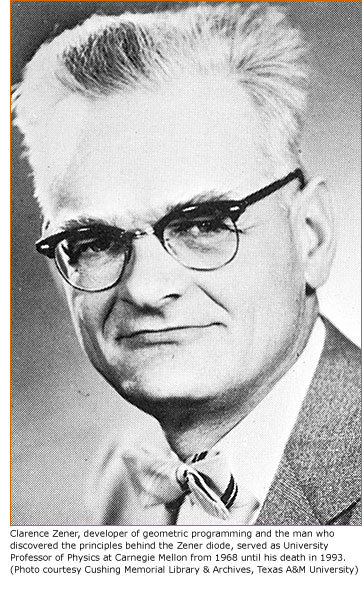
Though he wasn't a member of the computer science faculty, Carnegie Mellon Professor Clarence Zener had a profound effect on the design of digital computers and the algorithms they employ.
In 1934, while at Princeton, Zener discovered that certain electrical insulating materials--semiconductors--were able to regulate and limit voltage. That led to the invention 20 years later of Zener diodes, tiny solid-state voltage regulators that made reliable desktop computers a reality.
A physicist by training, Zener worked with Enrico Fermi and Edward Teller at the University of Chicago and taught there from 1945 to 1951, before becoming director of research for Pittsburgh's Westinghouse Electric Corp.
At Westinghouse, Zener became frustrated by engineers who tried to optimize their designs by setting arbitrary parameters and then using early digital computers to crunch numbers until they arrived at a solution. His more elegant approach--geometric programming--called for engineering problems to use adjustable parameters that were defined by mathematical functions. Geometric programming remains a staple of optimization theory today.
In 1968, Zener was recruited to Carnegie Mellon, where he remained a University Professor until his death in 1993. During the energy crisis of the 1970s, Zener became intrigued with harnessing the thermal currents of the oceans as a clean, inexpensive source of electrical power. Using geometric programming, Zener created computer models to optimize the necessary heat exchangers and the locations where they could be deployed.
To Zener's disappointment, cheap oil and changing political priorities in the 1980s dried up much of the research into ocean thermal energy conversion.
Today, concerns about manmade climate change are driving new research into "green" energy production and conservation at Carnegie Mellon's School of Computer Science. And many of the optimization models being used have their roots in the work of Clarence Zener.
In 1934, while at Princeton, Zener discovered that certain electrical insulating materials--semiconductors--were able to regulate and limit voltage. That led to the invention 20 years later of Zener diodes, tiny solid-state voltage regulators that made reliable desktop computers a reality.
A physicist by training, Zener worked with Enrico Fermi and Edward Teller at the University of Chicago and taught there from 1945 to 1951, before becoming director of research for Pittsburgh's Westinghouse Electric Corp.
At Westinghouse, Zener became frustrated by engineers who tried to optimize their designs by setting arbitrary parameters and then using early digital computers to crunch numbers until they arrived at a solution. His more elegant approach--geometric programming--called for engineering problems to use adjustable parameters that were defined by mathematical functions. Geometric programming remains a staple of optimization theory today.
In 1968, Zener was recruited to Carnegie Mellon, where he remained a University Professor until his death in 1993. During the energy crisis of the 1970s, Zener became intrigued with harnessing the thermal currents of the oceans as a clean, inexpensive source of electrical power. Using geometric programming, Zener created computer models to optimize the necessary heat exchangers and the locations where they could be deployed.
To Zener's disappointment, cheap oil and changing political priorities in the 1980s dried up much of the research into ocean thermal energy conversion.
Today, concerns about manmade climate change are driving new research into "green" energy production and conservation at Carnegie Mellon's School of Computer Science. And many of the optimization models being used have their roots in the work of Clarence Zener.
- You can download some source documents here, including one of Clarence Zener's original papers on ocean thermal energy conversion, a 1974 New York Times article about that research, and his 1993 obituary from Carnegie Mellon Magazine.
For More Information:
Jason Togyer | 412-268-8721 | jt3y@cs.cmu.edu

